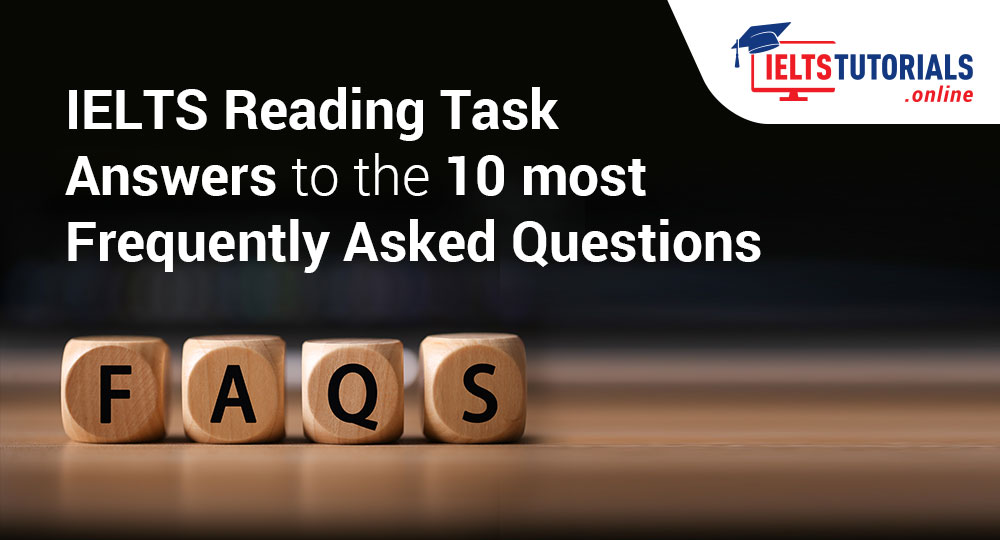
IELTS Reading Task Answers to the 10 most Frequently Asked Questions (FAQs)
The International English Language Testing System (IELTS) exam strives to find out the level of English language proficiency for aspirants who seek to move abroad to a country for further studies, work, etc.
The 9 - band exam tests an aspirant across 4 functional domains: reading, writing, speaking & listening. However, many IELTS aspirants have some general questions regarding IELTS Reading task.
In this blog, we aim to throw some light to a few popular IELTS - Academic & IELTS - General Training Reading Test FAQs, so that you can have a better understanding of the topic.
All the questions are clubbed in one post to make it simple and easy for you. Get ready as we take you through a journey of 10 popular FAQs that IELTS aspirants have.
10 Most Frequently Asked Questions of IELTS Reading Task
- IS THERE A DIFFERENCE BETWEEN IELTS - ACADEMIC AND GENERAL TRAINING MODULE?
- WHAT TO EXPECT IN THE READING PASSAGES?
- WHAT IS THE TOTAL TIME DURATION OF THE IELTS READING TEST?
- WHAT ARE THE TYPES OF QUESTIONS IN THE IELTS READING EXAM?
- HOW MANY QUESTIONS CAN ONE EXPECT IN THE IELTS EXAM?
- IS ONE ALLOWED TO WRITE ON THE READING QUESTION PAPER?
- HOW ARE THE IELTS READING TEST SCORES CALCULATED?
- HOW IMPORTANT IS SPELLING IN THE TEST?
- WHAT IS AN IDEAL TIME TO SPEND ON EACH QUESTION?
- WHAT IF YOU DON'T KNOW AN ANSWER?
1. IS THERE A DIFFERENCE BETWEEN IELTS - ACADEMIC AND GENERAL TRAINING MODULE?
Understand one thing. Only the IELTS listening & speaking parts remain the same for both the IELTS - Academic & IELTS - General Training aspirants. Reading & Writing tests are different for both, in terms of content and difficulty. Considering the IELTS Reading module, the passages and questions are easier in the IELTS General Training module.
2. WHAT TO EXPECT IN THE READING PASSAGES?
The texts in the IELTS - General Training are informative in nature; these are the types of texts you find in a notice, advertisement, newspaper, etc. On the other hand, the IELTS - Academic topics are mostly the academic type, sourced from authentic sources like magazines, journals, etc. The passages might be of different types and might also involve diagrammatic representation. In case technical terms are used in the passage, you'll be provided with a glossary. No previous knowledge of the topics is required beforehand though. There are 3 sections in the IELTS - General Training Reading test & 3 passages in the IELTS - Academic Reading test.
3. WHAT IS THE TOTAL TIME DURATION OF THE IELTS READING TEST?
The total time duration for the IELTS Reading test is 60 minutes. (1 hour) Bear in mind that if you write your answers on the question paper, you don't get any extra time to transfer your answers to the answer sheet.
4. WHAT ARE THE TYPES OF QUESTIONS IN THE IELTS READING EXAM?
The IELTS - Reading test involves solving a lot more than just Multiple Choice Questions. (MCQs) You also have questions asking you to identify information, identifying writer claims/views, matching information & headings, matching features & sentence endings, sentence completion, summary/note/flowchart
completion, diagram labeling and short answer questions. Approximately 13 questions follow each passage/section.
5. HOW MANY QUESTIONS CAN ONE EXPECT IN THE IELTS EXAM?
There are a total of 40 questions of various types as mentioned above in the IELTS Reading test.
6. IS ONE ALLOWED TO WRITE ON THE READING QUESTION PAPER?
Yes, one is allowed to write and make notes on the question paper. You can also underline, mark points or write on any part of the question paper. Know that the only thing which will be marked for evaluation is your answer sheet. It becomes helpful in locating answers.
7. HOW ARE THE IELTS READING TEST SCORES CALCULATED?
The total score is out of 40. The score is then converted into an IELTS band score of 0 - 9 according to an IELTS Band Calculator. The conversions are different for both the Academic & General Training modules.
8. HOW IMPORTANT IS SPELLING IN THE TEST?
Well, the test that you're taking is a part of your English language proficiency skills and therefore writing answers in the correct spelling is essential. Even if you know an answer and misspell it, it will be marked wrong. Therefore, pay attention to big words.
9. WHAT IS AN IDEAL TIME TO SPEND ON EACH QUESTION?
Assume that you utilize 15 minutes of your given time of 1 hour to READ the questions. That leaves you with 45 minutes to answer 40 given questions. Try not to spend more than 1 minute on each question. Even if you find a question difficult, don't take more than a minute to answer it. Return to the concerned question later.
10. WHAT IF YOU DON'T KNOW AN ANSWER?
You don't lose points over incorrect answers. Try not to miss out on any answer or leave an answer space empty. Try to recollect what you've extracted from the passage.
The best way to practice for the IELTS exam is to create and follow a dedicated & focused training plan. To start with, you can prepare with IELTS Online Coaching. Once you think you're all set, take the IELTS - Academic or IELTS - General Training Reading Practice Tests. Get your answers evaluated and improve one step a time.
If you like this blog and want to read more awesome content, make sure you download the IELTS Tutorials Mobile App so that you can prepare on the go! You can also try out our 20+ Free IELTS Practice Tests to achieve the desired score.